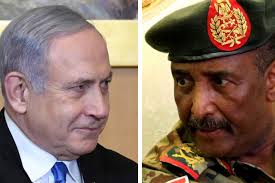February 5, 2020 at 4:17 am
The head of Sudan’s National Umma Party, Mubarak Al-Fadil Al-Mahdi, yesterday hailed the meeting of the Sudanese sovereignty council, Abdel Fattah Al-Burhan, with the Israeli Prime Minister Benjamin Netanyahu, describing their discussion as “bold and brave.”
“Al-Burhan’s meeting with Netanyahu is a bold and courageous step that serves Sudan’s interest in lifting the US sanctions, foremost of which is removing the name of Sudan from the so-called list of State Sponsors of Terrorism,” Al-Mahdi told reporters.
He added the meeting would “open a way to forgive Sudan’s debts, restore Sudan’s relations with international financial institutions to fund its economic development initiatives, achieve peace, and take advantage of Israeli agricultural techniques to develop the country’s agricultural and irrigation sector.”
Referring to his remarks about supporting the normalisation with Israel in 2017, Al-Mahdi pointed out that “many Arab countries had normalised with Israel,” explaining that the Palestinian-Israeli conflict had ended and was “undergoing international negotiations following the Oslo agreement.”
On Monday, Netanyahu’s press office revealed the meeting in a Twitter post, stating that the two leaders had agreed on “cooperation and normalising relations between the two countries [Sudan and Israel].”
The Sudanese government, on the other hand, said it was not notified or consulted ahead of the meeting. “The sovereignty council learnt about Al-Burhan and Netanyahu’s meeting in Uganda through the local media,” Sudanese information minister, Faisal Mohamed Salih, said, adding that the council was expecting a response from Al-Burhan after his return home.
Israel’s relations with Arab countries have been strained for years over the latter’s decades-long occupation on Palestine. There has been never been any official relations between Israel and Arab countries, except for Egypt and Jordan, both of which are tied with two peace treaties with Israel.
The meeting also came amid escalated tensions between Israel and the Arab and Islamic world following the recently-released US Middle East peace plan.
The so-called “Deal of the Century” was also rejected by the United Nations (UN). It said the deal was not based along with UN guidelines but is an imposition of the American president Donald Trump’s own vision of a two-state solution. The deal was also condemned by all Palestinian parties.

